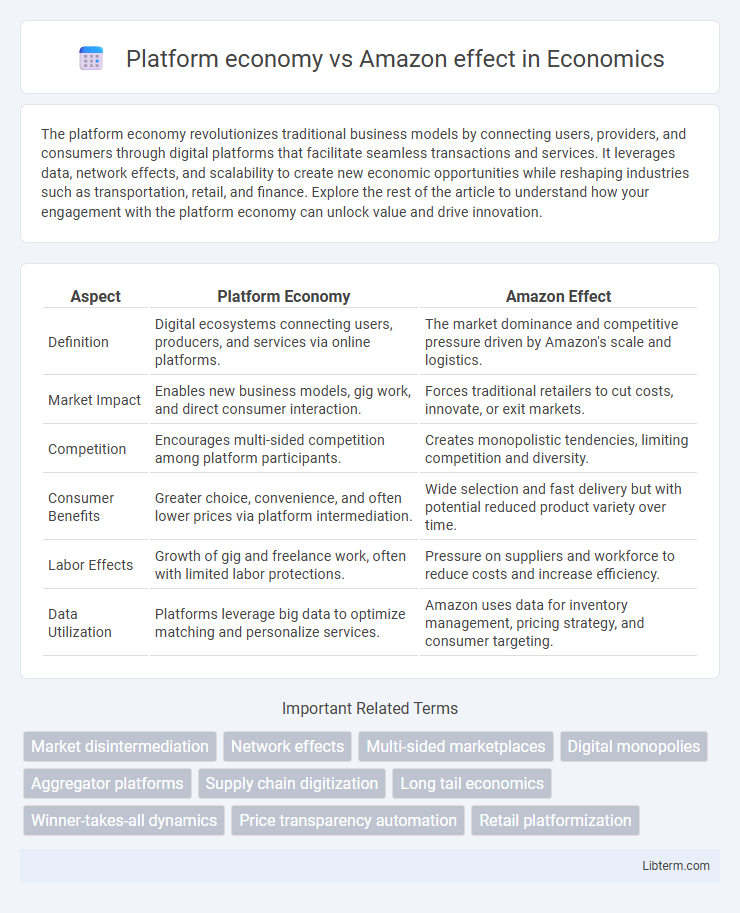The platform economy revolutionizes traditional business models by connecting users, providers, and consumers through digital platforms that facilitate seamless transactions and services. It leverages data, network effects, and scalability to create new economic opportunities while reshaping industries such as transportation, retail, and finance. Explore the rest of the article to understand how your engagement with the platform economy can unlock value and drive innovation.
Table of Comparison
| Aspect | Platform Economy | Amazon Effect |
|---|---|---|
| Definition | Digital ecosystems connecting users, producers, and services via online platforms. | The market dominance and competitive pressure driven by Amazon's scale and logistics. |
| Market Impact | Enables new business models, gig work, and direct consumer interaction. | Forces traditional retailers to cut costs, innovate, or exit markets. |
| Competition | Encourages multi-sided competition among platform participants. | Creates monopolistic tendencies, limiting competition and diversity. |
| Consumer Benefits | Greater choice, convenience, and often lower prices via platform intermediation. | Wide selection and fast delivery but with potential reduced product variety over time. |
| Labor Effects | Growth of gig and freelance work, often with limited labor protections. | Pressure on suppliers and workforce to reduce costs and increase efficiency. |
| Data Utilization | Platforms leverage big data to optimize matching and personalize services. | Amazon uses data for inventory management, pricing strategy, and consumer targeting. |
Understanding the Platform Economy
The platform economy drives value creation by connecting users, service providers, and data through digital marketplaces, enabling efficient resource allocation and innovation. It emphasizes network effects, scalability, and user-generated content, transforming traditional business models into interactive ecosystems. Understanding the platform economy highlights how it contrasts with the Amazon effect, which focuses on dominance through vast product selection, logistics, and pricing power.
What is the Amazon Effect?
The Amazon Effect describes the significant impact Amazon has on consumer expectations, supply chain logistics, and retail pricing strategies, driving the shift towards faster delivery, extensive product choices, and competitive pricing. This phenomenon challenges traditional retailers by prioritizing convenience, technology-driven personalization, and seamless digital shopping experiences. The platform economy leverages these principles but extends beyond one company, facilitating diverse online marketplaces where multiple sellers interact directly with global consumers.
Key Differences Between Platform Economy and Amazon Effect
The platform economy hinges on facilitating peer-to-peer exchanges and empowering multiple independent sellers through digital marketplaces, whereas the Amazon effect emphasizes the dominance of a single, vertically integrated corporation controlling supply chains and customer data. Platform economies rely on decentralized networks to create value and foster innovation, while the Amazon effect concentrates market power, driving pricing strategies and customer loyalty through scale and data analytics. This fundamental contrast in market structure shapes competitive dynamics, consumer choice, and regulatory challenges in the digital economy.
The Rise of Digital Marketplaces
The rise of digital marketplaces has significantly shaped the platform economy by enabling seamless connections between buyers and sellers through technology-driven ecosystems. This transformation, often referred to as the Amazon effect, pressures traditional retailers to innovate and adopt digital strategies to remain competitive. Marketplaces like Amazon leverage vast data analytics and network effects to dominate e-commerce, influencing pricing, consumer behavior, and supply chain dynamics globally.
Impact on Traditional Retailers
The platform economy significantly reshapes traditional retail by enabling direct consumer access to diverse products, which intensifies competition and reduces foot traffic to brick-and-mortar stores. The Amazon effect accelerates this shift through rapid delivery, personalized recommendations, and vast product assortments, forcing retailers to adopt omnichannel strategies and digital transformation to maintain market share. Traditional retailers face increased pressure to innovate in customer experience and supply chain efficiency to compete effectively in an online-dominated marketplace.
Market Power and Competition Dynamics
The platform economy centralizes market power through dominant digital intermediaries that control access, data, and user engagement, creating high entry barriers for competitors. The Amazon effect intensifies competitive pressure by leveraging scale, logistics, and data analytics to undercut prices and expand product offerings rapidly. This convergence reshapes competition dynamics, fostering market concentration while challenging traditional retailers and smaller platforms to innovate or exit.
Consumer Behavior in the Platform Era
Consumer behavior in the platform economy is shaped by seamless access to diverse goods and services via digital marketplaces, fostering convenience and personalized experiences. The Amazon effect intensifies these behaviors by setting high standards for fast delivery, competitive pricing, and user reviews, driving consumers to expect instant gratification and transparency. This dynamic compels brands to optimize their presence on platforms, adapt to evolving customer expectations, and leverage data analytics for tailored marketing strategies.
Technology and Innovation Drivers
The platform economy reshapes markets through technology-driven network effects, enabling seamless interactions between consumers and providers via advanced algorithms and scalable cloud infrastructure. Innovation in artificial intelligence, big data analytics, and APIs fosters personalized experiences and efficient transaction systems, intensifying competition. Amazon's effect leverages these technologies at scale, integrating logistics, digital marketplaces, and machine learning to disrupt traditional retail and accelerate platform adoption globally.
Economic Implications for Businesses
The platform economy reshapes market dynamics by enabling businesses to leverage digital ecosystems, reducing transaction costs and expanding global reach. The Amazon effect intensifies competition through aggressive pricing strategies, rapid delivery, and vast product assortments, forcing traditional retailers to innovate or risk obsolescence. Economic implications include shifting power toward platforms, altered supply chain structures, and increased pressure on profit margins for brick-and-mortar businesses.
Future Trends in Platform Economy vs Amazon Effect
The future trends in the platform economy highlight increased decentralization with blockchain integration, fostering secure peer-to-peer transactions and reducing reliance on centralized giants like Amazon. Emerging platforms emphasize niche market specialization and data privacy, challenging Amazon's broad market dominance and data-driven algorithms. Innovations in AI-driven personalization and sustainability practices are poised to reshape consumer expectations, further diversifying the competitive landscape beyond Amazon's current ecosystem.
Platform economy Infographic

 libterm.com
libterm.com